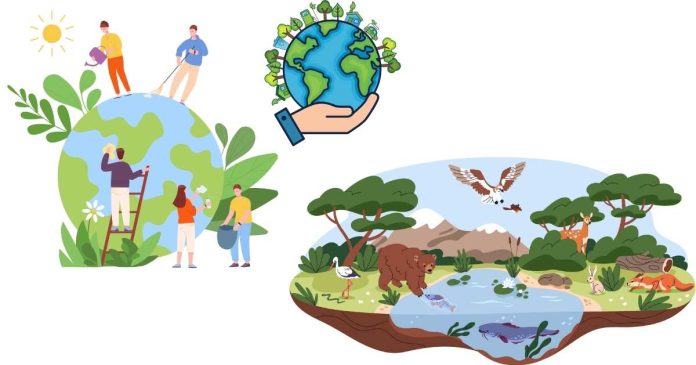The terms “ecology” and “ecosystem” are often used interchangeably, but they refer to distinct concepts in the study of life and its interactions with the environment. Both are essential for understanding how organisms interact with each other and with their surroundings.
In this article, we will explore the definitions of ecology and ecosystem, their characteristics, and the key differences between them.
What is Ecology?
Ecology is the scientific study of the relationships between living organisms and their environment. It examines how organisms interact with each other, as well as how they are influenced by physical factors such as climate, soil, and water.
Key Features of Ecology:
- Focus on Relationships: Ecology studies interactions between organisms and their biotic (living) and abiotic (non-living) environments.
- Levels of Study:
- Organismal Ecology: Studies individual organisms.
- Population Ecology: Examines groups of the same species.
- Community Ecology: Investigates interactions between different species.
- Ecosystem Ecology: Looks at energy flow and nutrient cycling within ecosystems.
- Purpose: Helps understand the balance of ecosystems, conservation efforts, and the impact of human activities on nature.
What is an Ecosystem?
An ecosystem is a specific area where living organisms interact with each other and with the non-living components of their environment. It includes both biotic components (plants, animals, microorganisms) and abiotic components (air, water, soil, sunlight).
Key Features of an Ecosystem:
- Self-Sustaining Unit: An ecosystem functions as a complete system, maintaining a balance between its components.
- Components:
- Biotic: Includes producers (plants), consumers (animals), and decomposers (fungi, bacteria).
- Abiotic: Includes factors like temperature, sunlight, air, and minerals.
- Processes: Ecosystems involve energy flow (from the sun through food chains) and nutrient cycling (such as the carbon and nitrogen cycles).
- Types of Ecosystems:
- Natural Ecosystems: Forests, deserts, oceans, rivers.
- Artificial Ecosystems: Farms, urban parks, aquariums.
Differences Between Ecology and Ecosystem
| Aspect | Ecology | Ecosystem |
|---|---|---|
| Definition | The scientific study of interactions among organisms and their environment. | A specific area where organisms and their environment interact as a system. |
| Scope | Broad, encompassing interactions across various levels, including organisms, populations, and ecosystems. | Narrower, focusing on a specific physical space and its living and non-living components. |
| Focus | Studies relationships, processes, and interactions. | Examines the structure, components, and functioning of a particular area. |
| Components | Does not include specific components but studies their interactions. | Includes both biotic (living) and abiotic (non-living) components. |
| Examples | Researching how pollution affects marine life or how predators control prey populations. | A forest ecosystem, a desert ecosystem, or an aquatic ecosystem. |
| Applications | Used for conservation, managing natural resources, and understanding biodiversity. | Used to study energy flow, nutrient cycles, and ecological balance in a specific area. |
Relationship Between Ecology and Ecosystem
- Interconnection: Ecology provides the scientific foundation for understanding ecosystems. While ecology studies interactions, an ecosystem is the physical manifestation of these interactions.
- Mutual Dependency: The functioning of ecosystems is a primary focus of ecological studies, making ecosystems a subset of ecology.
In summary, ecology is the broader discipline that studies the relationships between organisms and their environments, while an ecosystem is a specific, tangible unit where these interactions take place. Both concepts are vital for understanding the natural world and ensuring its sustainability. Whether studying ecological principles or examining a particular ecosystem, both contribute to our understanding of life and its intricate connections.


